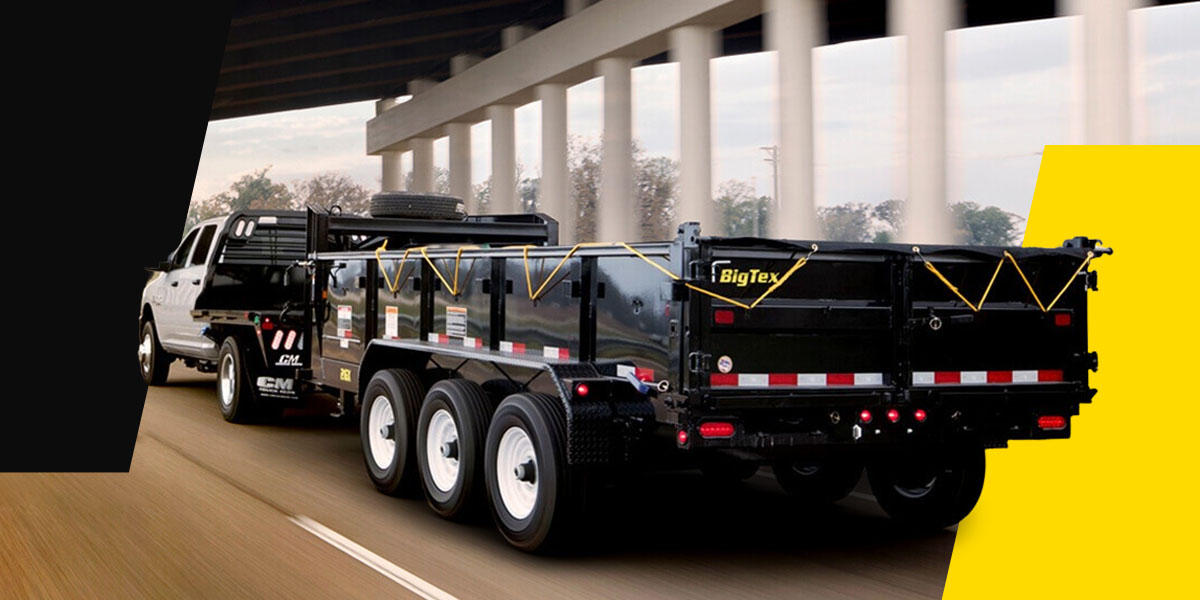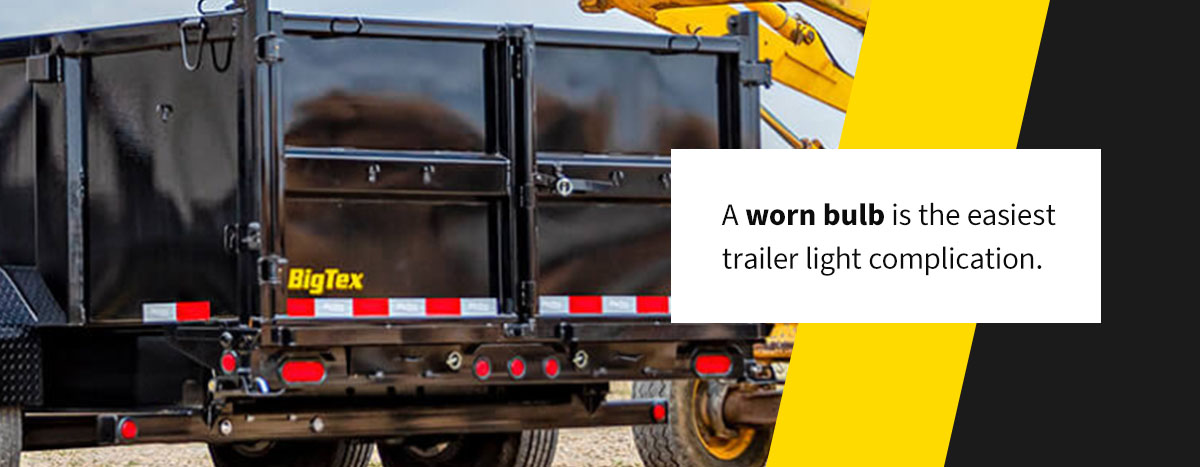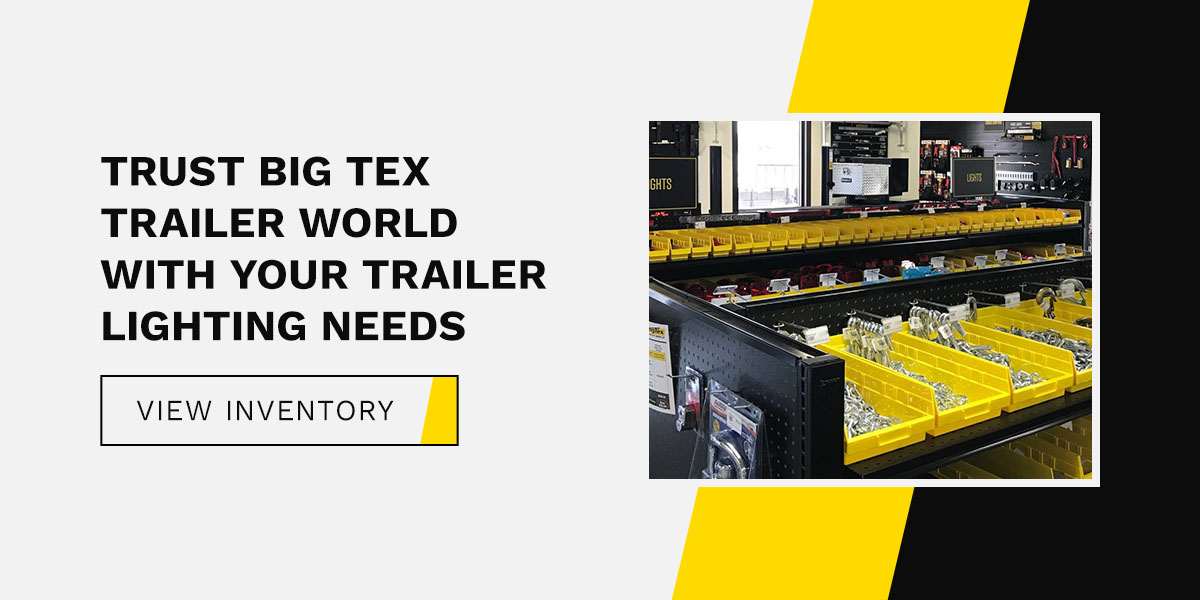
Understanding how to troubleshoot trailer light issues can help you keep your trailer in safe working condition. Various complications can cause lights to malfunction. It’s important to know what to look for so you can thoroughly inspect your vehicle and trailer to determine necessary repairs.
Common Reasons Trailer Lights Stop Working
Trailer lights are important for road safety, and you are required by law to have adequate light fixtures when towing a trailer. Faulty wiring or declining bulbs can cause various trailer light complications and cause your trailer lights not to work. You can tell your trailer lights require attention and maintenance if you notice any of the following signs:
- No light function: There are some problems that result in none of your trailer lights working.
- Partial light function: Wiring or bulb issues can cause some lights to malfunction while others operate correctly. For example, your brake lights may operate properly but your right turn signal doesn’t.
- Sporadic light function: A light may work at times and malfunction at other times, or it may flicker on and off.
- Gradual performance decline: Lights may work effectively for a while and gradually decline or stop working.
- Reverse light malfunction: In some situations, your trailer’s reverse lights may not work.
- Activation of the wrong lights: Some light issues can cause the wrong lights to turn on when you try to use certain ones. For example, both tail lights may turn on when you try to use one turn signal.
- Continual function: Some trailer lights may remain on when you turn the ignition off if there is a wiring issue.
- Faulty harness functioning: Your trailer harness may operate properly but malfunction when you connect your trailer if the trailer’s grounding wires need attention.
Various complications could be to blame if your trailer lights are not working. Determining the source is the first step to troubleshooting trailer light difficulties. Consider the following reasons your lights may malfunction to learn how you can restore this important safety feature on your trailer.
Disconnected or Corroded Ground Wires
Ground wires and bolts transfer power from your tow vehicle to your trailer, allowing the lights to work. Your tow vehicle’s four-prong plug contains a grounding wire that connects to the trailer or the trailer’s tongue. Most vehicle ground wires are white, and each end features a metal electrical connector eyelet.
Some trailer lights contain additional individual ground wires, so you may find a wire on each of your trailer’s lights. Other trailer lights feature bolts in place of ground wires. These electrical components can malfunction for the following reasons:
- Debris or corrosion: Ground wires and bolts must be clean to work properly. Any debris or corrosion can hinder a ground wire or bolt from transferring power to your lights. Ensure they are free of paint, debris and corrosion. If your lights contain bolts instead of wires, you may also need to clean the holes the bolts connect to.
- Loose connections or disconnection: If your trailer lights flicker when you gently shake your trailer, you may need to tighten the ground nuts.
- Old bolts: Using existing bolts can hinder a trailer from maintaining a solid electrical ground. You typically need to drill into the trailer to attach bolts with adequate coating.
- Folded trailer: A foldable trailer must be fully extended before you connect grounding wires and operate the lights. If your folding trailer’s lights don’t work, check to ensure the trailer is fully extended.
- Incompatible materials: Homemade trailers consisting of composite materials may lack the metal you need for a solid electrical ground. Tail light housings only work if they are connected to a metal trailer frame, so lights will not work on a plastic or wood frame.
Blown Fuse
Broke, pinched, crimped or worn wires can blow a fuse in a trailer’s electrical system. A blown fuse can also indicate you need to replace your vehicle’s fuse. If your fuse is in good condition, you should check your wires for damage. You can trace your wires to find the problem wire or replace your trailer’s entire wiring harness.
Worn Bulb
A worn bulb is the easiest trailer light complication. If a bulb is worn, you’ll most likely notice one of your tail lights fails to turn on. If your trailer’s electrical system is in good condition and the bulb is the only issue, you can resolve it easily by replacing it with a new one.
Trailer Light Troubleshooting Tips
Troubleshooting trailer light problems may seem challenging, but the process is simple when you know what to look for. Consider the following tips to simplify checking your trailer lights and electrical connections:
Test Your Electrical System’s Signal
Checking your tow vehicle for a blown fuse is the first step in identifying your trailer light complication. First, check your tow vehicle’s electrical circuit using a four-prong adapter.
Connect the adapter to your tow vehicle’s four-prong plug and test your right and left turn signals to ensure they work correctly. If both signals work, your tow vehicle’s electrical circuit and components are in good condition. However, your tow vehicle is to blame if the box receives no signal output. You may need to replace the fuse or fix the connecting points.
The grounding location is the cause of the malfunction if you notice the signal output enters the box without coming out or sends power to the wrong wires. It’s also important to check if cut or pinched harnesses are the cause.
Test Your Trailer’s Electrical Components
The trailer wiring is most likely the issue if the tow vehicle’s signal output reaches the correct wires when you test it. Connect your trailer lights to the four-prong plug. Use a wire brush to ensure the trailer light’s four-prong adapter is free of debris, and plug the adapter into your tow vehicle’s plug. This is also when you need to check the ground wires for misconnections or corrosion.
Be Thorough
A thorough inspection is important when checking your trailer lights. You should examine your vehicle and trailer’s bulbs, light fixtures, connections and fuse to find the source of light complications. The more thorough you are, the more likely you are to avoid further complications.
Prevent False Ground
False ground can hinder your ability to identify the true cause of light issues, but you can avoid false ground by disconnecting the trailer from your tow vehicle. The plug and jack should be the only connection between your tow vehicle and trailer when you check the ground wires, so make sure the following components are disconnected before testing the signal:
- Tow vehicle ball
- Trailer hitch
- Safety chains
- Safety cables
Tips for Hooking up Trailer Lights
Connecting your trailer lights correctly helps prevent damage and complications. You can hook up your trailer lights properly with the following tips:
- Ensure you have the essential components
- Choose the right connector
- Prevent trailer harness damage
- Seek professional lighting installation services for the best results
Trust Big Tex Trailer World With Your Trailer Lighting Needs
Trailer lights and their electrical components are important for safe towing. Big Tex Trailer World offers high-quality parts and expert installation and repair services to keep your trailer operating correctly. Contact us to learn more about how we can meet your trailer lighting needs or find a Big Tex Trailer World store near you.

